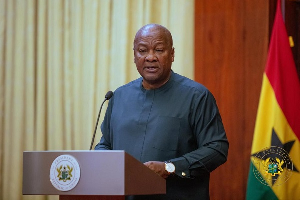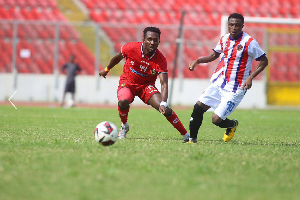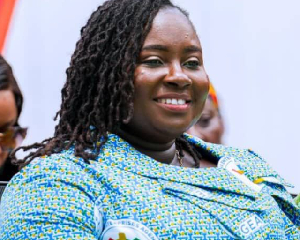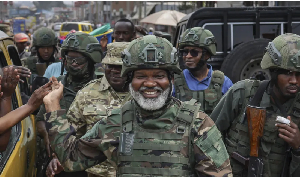...AND JOHN MAHAMA AS HIS VEEP
BY: P K Boateng
Prof John Evans Atta Mills, Ghana’s president from 07 January 2009 to 24 July 2012 is gone forever and we all wish him perfect rest in God’s bosom. The rest about him and his presidency is history. Views and opinions would obviously differ about whether or not he was successful as a president, depending on which side of the political divide in Ghana a person stood. In this article I have attempted to do an independent and objective evaluation of how he fared as president using universally accepted criteria.
Every honest Ghanaian who witnessed his three and a half years rule will agree with me that the late President John Evans Atta Mills was not the best leader Ghana had between January 7, 2009 and July 24, 2012. People are ascribing his poor leadership and ineffective government to his ‘long’ illness. Personally, (and I think many Ghanaians share the same view with me) I do not subscribe to that excuse because if he knew that he was handicapped by a serious illness, he should have said so to Ghanaians and resigned honourably before he succumbed to death unexpectedly on 24 July 2012. There was nothing he said or did during his presidency that gave the minutest hint that all was not well for him, healthwise. Even the last time he travelled to the US for actual medical treatment, Ghanaians were told that he had gone for a ‘medical check-up’. He was an intelligent man and added to this was the fact that the faculties of his mind were not impaired in any way for any person to suggest that he was not in control of what he said or did.
Why was he not honest with Ghanaians in many instances including the following:
Firstly, when he jogged at the airport in Accra on the day he returned from his ‘medical check-up’ in the US, was it not insulting to suggest that his operational staff advised him to jog to prove to Ghanaians that he was not ill? If indeed he heeded advice to jog so that we would all see him as fit and healthy, then sorry to say posthumously that he was a fool. Why did he have to pretend that all was well with him when in deed he was dying? And truly he died not long after the deceptive jogging. Ghanaians should not miss a person who knew he was very sick but ‘took the advice’ of his staff to embark upon a physical exercise that accelerated his demise.
Secondly when some of his operational staff gave conflicting statements about how he would campaign for the December 2012 general elections, he was quiet. No word came from Prof Atta Mills, the NDC flag-bearer, to clarify how he would campaign for his re-election – whether he would stay in his office and campaign by remote control as suggested by one of his operational staff or he would appear before rented crowds and only wave his hands - as suggested by another. Could he not have publicly told his countrymen the truth about his illness because his staff knew about his grave condition?
The third and the most absurd action by the late President was his decision to stand to be elected as the NDC’s flag-bearer in the December 2012 general elections. He sought to have a second term even when he knew he was terminally ill. Was he pushed against his will to stand as NDC’s flag-bearer in order to shut out Nana Konadu Agyemang Rawlings who was also aspiring to lead the party? Or was he so infatuated by the prospect of a second term president that he forgot momentarily the fact that he was terminally ill? Such a decision could only have been taken by a fool and I did not expect the late president to act in the way he did. Or do we blame the ruling NDC for pushing him too hard to his death?
Now to the main subject matter of this article – how did the late President John Evans Atta Mills perform? This evaluation, I hope, will assist us to make a good choice of the next leader in the December 2012 election.
I have chosen The People Management Association of the Philippines’ “attributes of a good president” to evaluate the performance of our late president. This evaluation, in a way also covers the performance of his successor, President John Dramani Mahama who was his Vice. For each attribute the marks to be awarded ranges from 0 to 10 - with 0 for the worst performance and 10 for the best performance.
The first attribute of a president of a country according to the People Management Association of the Philippines is that the president must be a decisive and intelligent “navigator” who knows how to steer the country towards a just and humane society. Was the late Prof John Atta Mills a decisive and intelligent navigator who knew how to steer Ghana to a just and humane society? To me he was not. He lacked that attribute. At a time, one could rightly argue that the late president was clueless as to what he should be doing as a leader. In fact he won power before thinking about what the job of a president of a country entailed. And to overcome this serious shortcoming, he tacitly allowed vile propaganda, lies and insults of perceived opponents to be spewed by his infantile operatives in the Castle in order to divert public attention to the weak leader he was. The NDC’s Better Ghana agenda is still on the drawing board, Ghanaians are yet to see the agenda started. A navigator is able to steer a vessel to safety but at the time of his death, the navigator, Prof John Atta Mills had even lost his compass in deep sea. On a score of 10 of this attribute, I will give our late President 0.
The second attribute of a president is a “mobilizer” who can build a national consensus. Could the late President mobilize Ghanaians and build a national consensus, if so, on what issues? During his presidency, his political opponents were at the receiving end of vile propaganda, attacks, insults and ridicule. It started with the seizing of cars by his security operatives in the first few months of his presidency, (Nana Akufo Addo, the NPP leader was a victim of this madness), to seizing of passports at the airport, to hauling former ministers and officials of the previous government to court. Again many projects his predecessor left uncompleted were abandoned by him because political credit would not be given to his government if he completed them. For example a housing project in the Ashanti Region started by the Kufour government was abandoned perhaps because the project is in an NPP stronghold (the Head of Monitoring & Evaluation at the Castle, Dr Tony Aidoo, was party to this decision). Other projects like the National Health Insurance Scheme and the National Youth Mobilization Programme which enjoyed national consensus and which his NDC government should have enhanced to greater efficiency and benefit to the people of Ghana were allowed to run down. He saw the old slave castle at Osu as a more decent office to operate from rather than the modern Jubilee House edifice (which he renamed Flagstaff House, a colonial name). A serious indictment was his inability to forge unity among Ghanaians but rather preside over a dangerously polarised nation. And the polarization was principally caused by his ministers, deputy ministers (especially in the Ministry of Information), his Castle operatives and spokesmen and chiefly by the NDC-aligned newspapers. Was the late President Atta Mills a mobilizer who could build a national consensus during his three and a half year presidency? The answer is no. On a score of 10, I will again give him 0.
The third attribute is that a president must be “a servant leader” who puts the public interest before vested interests. On this attribute and based on the facts about him in the public domain, I will give him 2 out of 10. His muted reaction to the exposure of gargantuan payments made to individuals and companies as ‘judgement debts’ and also the sacking of Mr Martin Amidu as the Attorney General who was seen by many as the sole crusader in the fight against the day-light theft of Ghana’s scarce resources, gave the impression that the late President Atta Mills was a remote beneficiary of some of the payments, especially the 52 million cedis paid to Mr Alfred Agbesi Woyome. The late President did not even act on the report of the investigation called to be conducted by the Economic and Organised Crime Office (EOCO) which showed that ministers in his government and their subordinates had conspired to dole out gargantuan amounts to individuals and companies. He calculated that the EOCO would find the NPP ultimately responsible for the losses because they might have terminated lawful contracts when they were in power. And it never turned out to be so as we have recently learnt. The late president strangely did not see the strategic implications of the looting especially the fact that the payments dented the ability of his NDC government to carry out its so called Better Ghana agenda. Calls for a properly constituted commission of enquiry to look into all the judgement debt payments were not heeded to. Did some of the money from Woyome not go to him personally and to the NDC of which he was the leader? We will never know.
The fourth attribute is an inspirational leader who can work with communities and the press to inspire unity, trust and optimism. On this, I again score our late president 0 out of 10. Even in his own party he could not inspire unity, trust and optimism. FONKAR and GAME were at each other’s throat. Few months before his death, the country was partially in flames due to communal conflicts – in Central, Volta, Northern and Upper East Regions. He looked on as communities killed each other – especially in Hohoe. A section of the press, especially the NDC-aligned ones engaged in a type of vile and gutter journalism unknown before in Ghana especially against the leaders of the opposition party, the NPP. Whilst the newspapers led the frontal attack by spewing venom, the government machinery, led by the Ministry of Information and the Castle spokesmen attacked the main opposition party from behind – insulting, vilifying and denigrating its leaders, especially Nana Akufo Addo, the NPP leader. The late President Atta Mills was never an inspirational leader. Observers of Ghana sometimes wondered if there was a leader in the country especially during the brief period when many communal conflicts erupted across the country.
The final attribute of a president according to the People Management Association of the Philippines is a guardian of national wealth who can make and defend unpopular decisions for the common good.
I will add two attributes by the late Hedley Donovan, a former editor-in-chief of Time magazine and a White House advisor.
First he says the presidential bedrock must be integrity – perceived and real. Integrity includes an honourable private life.
Secondly a president must offer the country vision and he must animate his administration with purposes larger than enjoyment of office.
Ghanaians can award marks (0 – 10) according to how they rate the late President against these last three attributes.
And his successor John Dramani Mahama, do we exonerate him from such abysmal performance of his former boss? Which area of government was delegated to him by the late president that he excelled – the economy, housing, crime control, infrastructure? Ghanaians are interested to know because he wants to have his own full term of four years as president after the elections in December, if he wins.
President Mahama has already started blowing his own horn, claiming that he is the first post-independence born to assume the presidency and that God played a hand in his elevation to the high position by making Prof Mills die. He is now passionately appealing to the youth in Ghana to vote for him to become the President in 2013 because he is young and all his others opponents are old. Are the youth in Ghana now better of after Mahama’s vice presidential three and a half years governance, than they were before he was sworn in on 7 January 2009?
To the other presidential aspirants the same yardstick will be used to appraise your performance after your first four years of governance.
(The writer is a Fellow of both the Chartered Institute of Management Accountant and Institute of Chartered Secretaries & Administrators and consultant in both public finance management and corporate governance).
Opinions of Sunday, 12 August 2012
Columnist: Boateng, P. K.


















